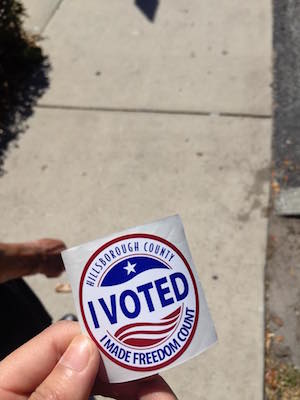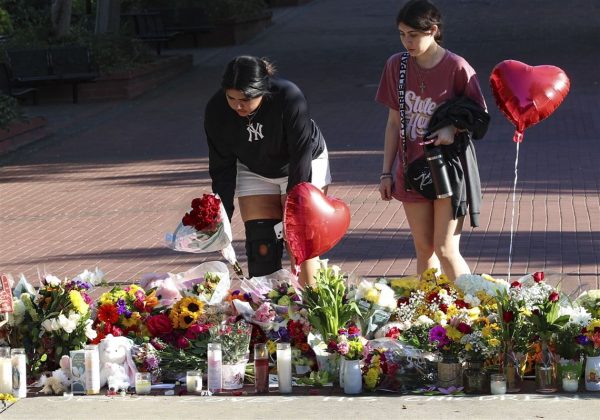Your Questions About Elections Answered

Credit: Pia Roca/Achona Online
AHN Senior Pia Roca was excited when she voted for the first time in this year’s Florida Primary elections!
It’s election year and all of the politics and positions can get very confusing and seem out of control. With all the political drama, it’s hard to keep up with where we are in the State of the Race and what is going on. The most frequently asked questions about the elections in general range from: How is the amount of delegates per candidate decided? What does a delegate do? To what is the purpose of a convention? What happens next? This is a simplified crash course on the answers to these questions.
Candidates
Who can run?
- There are only three requirements specified in the Constitution:
- must be a natural born citizen
- a resident in the U.S. for 14 years
- must be 35 years old or older

- Requirements to be on the states ballot differ between states.
Voters
- Nationwide you must be 18 years old and registered to vote.
- In Florida, if you are 18 at the time of the general election, you can vote in the primary if you’re 17.
- You can pre-register at 16.
- Voter ID is required that shows your name and a photo on it. A voter ID can be:
- A U.S. Passport
- A debit or credit card
- A student ID
- A neighborhood association ID
- A driver’s license

- Requirements to vote differ between states. Some have different deadlines to register and others may require voter ID.
Where do you go to vote?
- This website will help find the polling place for you.
Primaries
Florida is a primary state meaning that we vote for candidates in a primary.
How do you vote in a primary?
- Votes are cast in secret, usually in a voting booth.

- Ballots vary between states because to get on a ballot candidates must meet different state requirements.
Caucus
How do you vote in a caucus?
- Voters raise their hands or break into groups to be counted

Delegates
What are delegates?
- Delegates are representatives of the party that vote on behalf of the state.
What does a delegate do?
- When a primary or caucus takes place, delegates of that state cast their votes based off of the popular vote.
- Some delegates are required to vote based off of the voters choice while others are not.

How many delegates does a candidate need?
- Republican candidates need 1,237 delegates(majority) to win the nomination
- Democratic candidates need 2,383 delegates (majority) to win the nomination
How is the amount of delegates per candidate decided?
- Each state has a certain amount of delegates that are divvied out based on “winner takes all” or by proportion.
What happens if a candidate with delegates drops out or suspends his campaign?
- Drops out– delegates are “unbound” and can vote for whoever they want
- This rule varies between states as many are required to remain bound to the candidate for the first round at a contested convention.

- Suspends- If a candidate suspends their campaign they get to keep their delegates for the first round of voting at a contested convention.

Conventions
What is a convention?
- A convention is where the two parties announce who their nominee will be.
What happens at a convention?
- Conventions usually last a couple days and the parties have special guest speakers and hold events.
- The Republican National Convention will be held in Cleveland Ohio, on July 18-21.

- The Democratic National Convention will be held in Philadelphia, Pennsylvania on July 25-28.

Contested and Brokered Conventions
- If the candidates fall short of the number of delegates they need they can try to win the rest at the convention.
What is a contested convention?
- A contested convention is like the first round of voting within the convention.
- Things tend to get hectic because the candidates try to convince the delegates that are “uncommitted.”
- If the candidate still cannot get the votes desired it goes to another round of voting and becomes a brokered convention.

What is a brokered convention?
- Any delegates bound to a candidate are no longer required to vote for them.
- This part is usually known for its backdoor wheeling and dealing.
- The last brokered convention took place in 1976.

General Election
- The general election is between the nominees of each party.
- The election is always on the second Tuesday of November.
- Usually between the Republican and Democratic nominees but there can also be another nominee running for a different party like Independent’s.
- This is reffered to as a third party
- The winner of the general election will be the next President of the United States.
- This year the election is on November 8, 2016.


Jeanine Ramirez is an Academy senior, fourth-year journalist and the News Editor for the Achona. Following her interests in the social sciences, Jeanine...








Ms. Filocco • Apr 4, 2016 at 12:44 pm
Very informative article. Nice job, Jeanine!